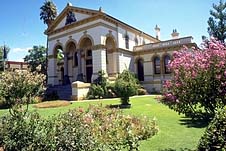
|
| Dubbo Courthouse
|
Dubbo
Large inland city famous for the outstanding Western
Plains Zoo
Dubbo is a very typical larger Australian country town. It
is the commercial, industrial and administrative hub of the
Central West and is also one of Australia's fastest-growing
inland cities. Dubbo is located on the Macquarie River, 264
metres above sea-level and 412 km north-west of Sydney at
the intersection of the Mitchell and Newell Highways. It is
characterised by a substantial shopping area, a number of
historic buildings, and an active community life which
reflects the town's population of about 38 000.
The area is noted for its wheat and wool production
although stock-raising, other forms of agriculture and
numerous non-food-related industries make contributions to
the regional economy. Dubbo is a major stock-selling centre
with a number of abattoirs and it is also an important
educational centre.
The first Europeans in the area were the party of John
Oxley who passed the future site of Dubbo in 1818. Oxley
noted the quality of the soil, the water supply and the
abundance of wildlife, including howling dingoes which kept
him awake at night. At that time the Wiradjuri people were
said to be in occupation of the land.
In 1824 two squatters were given permission to set up
large sheep and cattle properties adjacent the Macquarie
River, although they appear to have withdrawn at some
subsequent date. The first permanent settler was Robert
Dulhunty - described as one of the colony's wealthiest
citizens - who departed Penrith with a party of some 40
Aboriginal guides some time between 1829 and 1833, choosing
grazing land which he named 'Dubbo' just to the south of the
present townsite. It is certain he took the word from the
local Aborigines but its meaning is entirely unclear.
In 1839 records indicate that there were 28 persons over
12 years of age at Dubbo station and 18 male convicts (no
females). Dulhunty may have established some kind of
roadside inn in 1839 and he certainly built a homestead at
Dubbo in 1840 but he remained an absentee landlord until
1847 when his family finally moved from Emu Plains to Dubbo.
His wife was allegedly the first person to cross the Blue
Mountains in a carriage. The first school in the district
was a slab hut built on the Dubbo property in the 1840s.
In 1846 the government decided to establish law
enforcement institutions at Dubbo. Dulhunty was angry when a
site was chosen about 5 km downstream of his property but he
lost an appeal and a crude slab police residence and lock-up
became the first buildings on the future townsite in 1847.
An equally rough courthouse was completed in early 1848 and
a post office opened within the courthouse that same year.
Meanwhile, Jean Serisier, a Frenchman in the employ of a
Sydney-based firm, entered into negotiations with Dulhunty
over the establishment of a store and an inn near Butler's
Falls - the area's main river crossing - which was located
on Dulhunty's property. The idea was to benefit from the
growing through-traffic as settlers began to head westwards
from Wellington - then the most westerly point of settlement
in the state. However, the two fell out and Serisier opened
a general store near the new lock-up in 1847. Nicholas
Hyeronimus established an inn adjacent the store in 1848.
However, as neither Serisier nor Hyeronimus had tenure of
the land, and as both had incurred the wrath of the leading
landholder, they organised a petition of local residents
requesting that allotments be laid out for sale on the site.
Although the surveyors failed to affirm that the
establishment of a village on the site was necessary, the
village of Dubbo was planned and proclaimed in 1849 with the
first land sales taking place in 1850 (Dulhunty's estate
subsequently became known as 'Old Dubbo'). The population
was recorded as 47 in 1851, at which time there were seven
completed houses.
Development was slow initially as the squatters held
almost all of the land and were antagonistic to the
existence of the village. However, in the 1850s, the buoyant
markets of Melbourne began to attract stockmen from the
north who overlanded their cattle and sheep from NSW and
Queensland. To its benefit, Dubbo was located just off the
Great North Road (the principal north-south stock route)
which crossed the Macquarie River at Butler's Falls.
Consequently, a crude makeshift bridge was built in the late
1850 and Dubbo became a major trading post on the Great
North Road. The first Catholic Church was in existence by
1856, a national school was built in 1858 to replace an
earlier private school and an Anglican church and parsonage
were erected in 1859
As late as 1864, there were only two stores and two
hotels in town. However, rapid change was afoot. When the
first proper bridge over the Macquarie was built at Dubbo in
1866 a journalist reported that the village had 'magnificent
and commodious' stores, five hotels with a sixth nearing
completion, a mill under construction, and a 'well designed
court house and lock-up'. The most notable inmate of the
lock-up in question was bushranger Johnny Dunn who escaped
from its confines in 1865 (he was later recaptured and hung
in Sydney).
Dubbo's first newspaper went into print in 1866, the
first bank opened in 1867 and the first hospital was built
in the late 1860s. Moreover, as the squatters' licenses
began to elapse, selectors began to take up smaller
holdings, gradually altering patterns of land usage to
include agriculture, although wool-production remained
important amidst the new income from wheat, fruits, maize,
potatoes, tobacco, pumpkins and cotton. Jean Serisier
established a vineyard in 1868 which became one of the
largest in the colony in the 1870s. Gold, coal, chalk,
copper, diamonds and other precious stones were also mined
in commercial quantities in the district. A tannery and a
wool-scouring works were opened in 1873.
By the time Dubbo became a municipality in 1872 it had a
population of some 850 people and it had become the major
manufacturing and service centre to much of western NSW. The
arrival of the railway (and a railway bridge) in 1881
further contributed to Dubbo's importance. By that time it
had 29 hotels, three breweries and a population of 3199,
although the railway precipitated further settlement and
population growth.
Thomas Alexander Browne served as police magistrate at
Dubbo from 1881 to 1884. As 'Rolf Boldrewood', he wrote what
is considered one of Australia's first novels of any note,
Robbery Under Arms, which was published in serial form while
he was still at Dubbo.
A visitor in 1885 described Dubbo as a 'pretty little
town, built on an extensive plateau of squatting land'. He
also noted three banks, streets 'mostly lined with neat red
brick cottages' and 'a number of substantial shops'. By this
time there were also several substantial churches and
schools, a library and the town's third and present
courthouse was under construction. A flour mill opened in
1893.
Dubbo has grown considerably since World War II, almost
doubling its population between 1947 and 1971, and doubling
it again since 1971. Dubbo was declared a city in 1966.

Broadwalk
Business Brokers
Broadwalk Business
Brokers specialise in General Businesses for Sale, Caravan Parks for
Sale, Motels for Sale, Management Rights & Resorts for Sale, Farms for
Sale, Hotels for sale,Commercial & Industrial Properties for Sale.
Phone:
1300 136 559
Email:
enquiries@broadwalkbusinessbrokers.com.au
AUSTRALIAN BUSINESSES FOR SALE
COFFS HARBOUR BUSINESS BROKERS
BROADWALK BUSINESS BROKERS
GOLD COAST BUSINESSES FOR SALE
BRISBANE BUSINESSES FOR SALE
SYDNEY BUSINESSES FOR SALE
CARAVAN PARKS FOR SALE
BUSINESSES FOR SALE
MOTELS
FOR SALE
HOTELS
FOR SALE
Disclaimer
We advise prospective purchasers that we take no
responsibility for the accuracy of any information in the business
provided by vendors or their professional advisers and that they should
make their own enquiries as to the accuracy of this information,
including obtaining independent legal and/or accounting advice
Dubbo

